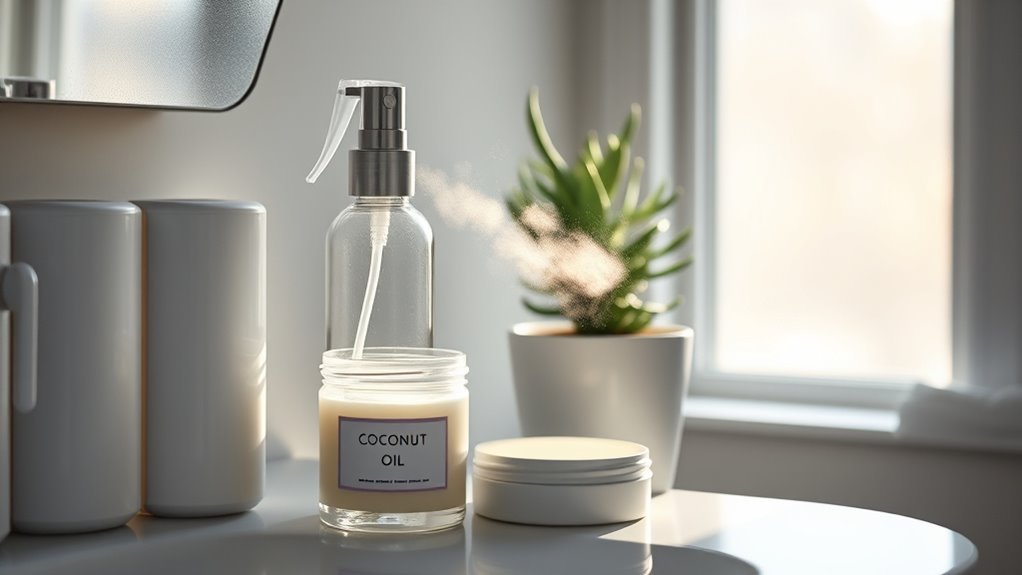Keto crotch smell is a distinct odor some experience while on a ketogenic diet, resulting from the body’s fat-burning processes and hormonal shifts. As your body shifts to ketosis, the release of ketones can affect body odor, creating a sweet or fruity scent. This is often linked to changes in metabolism and increased protein intake. By following proper hygiene practices and dietary adjustments, you can manage this odor effectively. There’s more to uncover about this phenomenon.
Understanding Ketosis and Its Effects on the Body

When you enter ketosis, your body shifts from using carbohydrates as its primary source of energy to burning fat for fuel. This ketosis process puts your body into a metabolic state where it becomes highly efficient at utilizing stored fat. As glucose availability decreases, the liver converts fatty acids into ketones, which serve as an alternative energy source for your brain and muscles. This change can lead to various physiological effects, including increased energy levels and appetite suppression. Many people experience enhanced mental clarity and focus during this time. Understanding this metabolic state is essential if you’re seeking the benefits of a ketogenic lifestyle, as it empowers you to make informed choices that align with your health goals and desire for freedom. Additionally, a properly followed keto diet can improve metabolic health, making it a sustainable option for many individuals.
What Causes Keto Crotch Smell?

Keto crotch smell can often be attributed to the process of ketosis, where your body burns fat for fuel, leading to the production of certain ketones that can impact body odor. Hormonal changes associated with diet shifts may also play a role, affecting how your body metabolizes and excretes waste. Additionally, specific dietary factors, such as increased protein intake or certain food choices, can influence this unpleasant odor.
Ketosis and Body Odor
As your body enters ketosis, it begins to produce ketones as an alternative energy source, which can lead to changes in body odor, including what’s colloquially known as “keto crotch.” This phenomenon arises primarily due to the breakdown of fat for fuel, releasing byproducts that can affect your scent. These metabolic changes during keto adaptations can alter how your body processes and excretes certain compounds.
- Increased production of acetone, a type of ketone
- Changes in urinary byproducts that can create distinct odors
- Altered skin microbiome that may contribute to body odor
While these changes can be surprising, they’re typically temporary. Staying hydrated and maintaining good hygiene can help mitigate these effects as your body adjusts to ketosis. Additionally, understanding the importance of hydration can further support your body during this transition.
Hormonal Changes Impact
While your body adapts to a ketogenic diet, hormonal changes can play a significant role in the development of what’s known as “keto crotch.” Fluctuations in hormones such as insulin, cortisol, and estrogen can affect how your body metabolizes fats and processes waste, ultimately influencing body odor. These hormonal fluctuations can disrupt your hormonal balance, leading to an increase in certain compounds that contribute to odor.
| Hormone | Impact on Body Odor |
|---|---|
| Insulin | Can influence fat metabolism |
| Cortisol | Affects stress and sweat |
| Estrogen | Impacts vaginal flora balance |
| Progesterone | May alter skin odor |
Understanding these hormonal dynamics can help you navigate and manage this unique aspect of the keto experience.
Dietary Factors Influence
Certain dietary factors can markedly contribute to the development of “keto crotch” smell. When you’re following a ketogenic diet, your body undergoes significant shifts that can impact your overall odor. To maintain a healthy nutrient balance and minimize unpleasant smells, consider these dietary adjustments:
- Hydration: Drinking enough water helps flush out ketones and reduce odor.
- Fiber Intake: Incorporating fiber can improve gut health and lessen the buildup of odor-causing bacteria.
- Balanced Fats: Choosing high-quality fats over processed options can support your body’s metabolic processes.
The Role of Ketones in Body Odor

Ketones, the byproducts of fat metabolism, play a significant role in body odor for those following a ketogenic diet. As your body shifts from glucose to fat for energy, ketone breakdown releases compounds like acetone, which can contribute to noticeable changes in your scent. These ketones are excreted through breath, sweat, and urine, often leading to an odor that some describe as fruity or nail polish remover-like. While this may be alarming, it’s a natural consequence of the metabolic shift. Understanding this process can help you embrace the changes, allowing you to enjoy the freedom that comes with a ketogenic lifestyle. Elevated ketone levels can also empower you to find ways to manage any unwanted body odor.
Other Common Side Effects of the Keto Diet
When starting the keto diet, you might experience a range of side effects, including what’s commonly referred to as “keto flu,” which can manifest as headaches and fatigue. Additionally, digestive issues and potential nutrient deficiencies are often reported, stemming from the significant dietary changes involved. It’s important to be aware of these effects to manage them effectively and maintain a balanced approach to your new eating plan. Staying informed about nutrient deficiencies is essential for minimizing adverse effects on your overall health.
Keto Flu Symptoms
As you begin a ketogenic diet, you might experience a set of symptoms commonly referred to as “keto flu.” This temporary condition can occur as your body shifts from burning carbohydrates for energy to utilizing fat instead. While the keto flu can be uncomfortable, understanding its symptoms can help with symptoms management.
- Fatigue and lethargy
- Headaches and dizziness
- Nausea and irritability
These symptoms typically last for a few days to a week. Staying hydrated, replenishing electrolytes, and gradually adapting into the diet can ease the process. Remember, the keto flu is a sign that your body is adjusting, and addressing these symptoms can enhance your keto journey, allowing you to embrace the freedom and benefits of this lifestyle. Additionally, maintaining a low carb intake is crucial for achieving health goals on keto and can help mitigate some of the discomfort associated with keto flu.
Digestive Issues
While many people experience weight loss and increased energy on a ketogenic diet, digestive issues can also arise during this dietary change. Your body may struggle to adapt to the reduced carbohydrate intake, leading to symptoms like bloating, constipation, or diarrhea. This often occurs due to changes in gut bacteria and the production of digestive enzymes. As you switch to a higher fat intake, your gut flora may shift, which can disrupt digestion temporarily. To ease these issues, consider incorporating fermented foods or probiotics to support gut health. Additionally, staying hydrated and gradually increasing fiber intake can help maintain regularity and overall digestive comfort. Understanding these challenges can empower you to make informed choices while enjoying the benefits of a keto lifestyle. It is important to monitor your nutritional balance to prevent potential deficiencies that may exacerbate digestive concerns.
Nutrient Deficiencies
Adopting a ketogenic diet can lead to significant shifts in your nutrient intake, which might result in deficiencies if not carefully managed. Since the diet restricts certain food groups, you may find it challenging to maintain proper nutrient absorption and vitamin balance. It’s essential to monitor your intake to avoid potential issues.
- Magnesium: Important for muscle and nerve function.
- Vitamin D: Essential for bone health and immune function.
- Fiber: critical for digestive health.
Incorporating a variety of low-carb vegetables and considering supplements can help you maintain a well-rounded diet. By being proactive, you can enjoy the benefits of keto without sacrificing your overall health. Consultation with healthcare professionals is key to ensuring you address any potential deficiencies effectively. Remember, balance is key to long-term success on this diet.
How to Identify Keto Crotch Smell
Identifying keto crotch smell can be challenging, especially since its symptoms might be mistaken for other issues. If you’re following a keto diet, pay attention to changes in your body chemistry. This condition often manifests as a distinct odor in the genital area, which may be described as sweet or fruity, similar to acetone. You might also notice increased moisture or irritation. If you find that these symptoms coincide with your dietary shifts, it’s likely related to the ketogenic process, where your body is burning fat for fuel. Keep in mind, though, that hygiene and other health factors can also play a role. Recognizing these signs early can help you take action before it becomes a more persistent issue.
Tips for Managing and Preventing Keto Crotch Smell
To effectively manage and prevent keto crotch smell, it is crucial to maintain proper hygiene and make some dietary adjustments. Here are some tips to help you stay fresh:
- Hydration Strategies: Drink plenty of water to dilute ketones and reduce odor. Aim for at least 2-3 liters daily.
- Choose Freshening Products: Look for pH-balanced intimate washes or sprays designed to eliminate odors without disrupting your natural balance.
- Adjust Your Diet: Incorporate more low-carb, fiber-rich foods to promote healthy digestion and minimize odor-causing bacteria.
The Importance of Hygiene on a Keto Diet
While following a keto diet can lead to significant health benefits, it’s essential to prioritize hygiene to combat any potential side effects, including unpleasant odors. Keto hygiene practices play an important role in maintaining your overall well-being. As your body adapts to ketosis, changes in sweat and body odor can occur, making personal care more important than ever. Regular bathing, using antibacterial soaps, and wearing breathable fabrics can help mitigate these effects. Additionally, maintaining good genital hygiene is critical to prevent issues like keto crotch smell. Staying hydrated and managing your diet can also support your body’s natural detoxification processes. By focusing on hygiene, you can enjoy the freedom of your keto journey without the discomfort of unwanted odors. Moreover, incorporating probiotics for gut health can further enhance your overall well-being and help manage any digestive issues that may contribute to unpleasant odors.
When to Consult a Healthcare Professional
Maintaining proper hygiene can greatly help manage the side effects of a keto diet, including unusual odors. However, if you notice persistent or worsening symptoms, it’s essential to seek professional advice. Consider consulting a healthcare professional if you experience:
Proper hygiene can help with keto-related odors, but consult a healthcare professional if symptoms persist or worsen.
- Severe or persistent odor that doesn’t improve with hygiene
- Accompanying symptoms like itching, irritation, or unusual discharge
- Concerns about your overall health or dietary changes
A proper symptom evaluation can rule out underlying conditions or infections that may require treatment. Remember, it’s always better to be proactive about your health. Addressing any concerns early can help you enjoy the benefits of a keto lifestyle without unnecessary discomfort or worry. Don’t hesitate to reach out for support when needed.
Embracing the Keto Lifestyle With Confidence
Embracing the keto lifestyle can feel intimidating at first, especially with the myriad of changes it brings to your diet and daily routine. However, with the right approach, you can navigate this shift confidently. Understanding the science behind ketosis helps demystify the process and reassures you that you’re making informed choices. Focus on whole, nutrient-dense foods like avocados, leafy greens, and healthy fats, as they’ll fuel your body effectively. Remember, challenges like keto crotch smell are temporary and manageable. By staying educated and connecting with others on this journey, you’ll find support and encouragement. Additionally, being aware of potential nutritional deficiencies can help you make better choices to maintain overall health. Embracing confidence in your choices will empower you to fully enjoy the benefits of the keto lifestyle, leading to a healthier, more liberated you.
Frequently Asked Questions
Can Keto Crotch Smell Affect My Partner’s Health?
Keto crotch smell typically doesn’t pose a direct health risk to your partner, but it can lead to uncomfortable reactions. As you follow the keto diet, your body produces ketones, which can cause unusual odors. While it may not be harmful, it can affect intimacy and partner reactions. Maintaining good hygiene and staying hydrated can help mitigate any unpleasant smells, ensuring a healthier environment for both you and your partner.
Is Keto Crotch Smell Permanent or Temporary?
Keto crotch smell is usually temporary. When you start a keto diet, your body undergoes significant changes, leading to shifts in body odor due to increased ketone production. This change can last a few weeks as your body adjusts. However, maintaining proper hygiene and staying hydrated can help mitigate the odor. If it persists beyond the adjustment phase, it might be wise to consult a healthcare professional for further evaluation.
Does Hydration Impact Keto Crotch Smell?
Yes, hydration considerably impacts keto crotch smell. Proper hydration methods, like drinking plenty of water and incorporating electrolyte-rich fluids, can help dilute ketones and reduce odor. Staying well-hydrated promotes overall body function and aids in odor prevention, making it less likely for unpleasant smells to develop. If you’re experiencing this issue, focusing on your hydration can provide relief while allowing you to enjoy the freedom and benefits of a ketogenic lifestyle.
Are Certain Foods More Likely to Cause Keto Crotch Smell?
Certain foods can indeed contribute to the unique bouquet you might notice on a keto diet. While indulging in high-fat, low-carb delights, your body processes fats differently, leading to changes in body odor. Foods rich in certain amino acids or those that cause fermentation in your gut can exacerbate these aromas. Staying well-hydrated and choosing your meals wisely can help mitigate these effects, allowing you to maintain that sense of freedom in your keto journey.
Can I Still Enjoy Intimacy While Experiencing Keto Crotch Smell?
Yes, you can still enjoy intimacy while dealing with keto crotch smell. Consider intimacy tips like maintaining good hygiene and wearing breathable fabrics. For effective odor management, shower regularly and use pH-balanced products. Staying hydrated can also help. Communicating openly with your partner about any concerns can foster understanding and support. Remember, intimacy is about connection and trust, so focus on the emotional bond, even if physical aspects require a bit of extra care.


